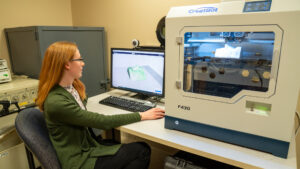
Eric Kmiec, Ph.D., executive director and chief scientific officer of ChristianaCare’s Gene Editing Institute, has been selected as editor-in-chief of the scientific journal Gene and Genome Editing. Kmiec served three years on the journal’s board prior to this new position.
“This leading journal in the field has created an environment where gene editing research can undergo rigorous review and provide the field with cutting-edge findings that benefit all,” Kmiec said.
“We have a unique opportunity to fill a void in the field by focusing on clear messages about the foundational aspects of gene editing and accepting papers that cover groundbreaking gene editing discoveries.”
Susanne Steiginga, MSc, executive publisher of Gene and Genome Editing, said, “I am delighted with Eric’s appointment and the plans he has to take the journal in a new direction.
“Eric comes with a wealth of knowledge, and every time I speak with him, I’m thrilled to realize how similar our goals and ambitions are for the journal.”

Kmiec is the founder and executive director of the ChristianaCare Gene Editing Institute. He is also the chief executive officer and scientific founder of CorriXR Therapeutics. He is widely recognized for his pioneering work in the fields of molecular medicine and gene editing. Throughout his career, Kmiec has led research teams in developing gene editing technologies and genetic therapies for inherited disorders and cancer.
His research has helped elucidate the regulatory circuitry that controls the gene editing of human cells. Current clinical research centers on developing CRISPR-based gene editing approaches for solid tumors. Squamous cell carcinoma of the lung and esophageal cancer are the lead protocols now advancing through the FDA approval process.
Gene and Genome Editing has “created an environment where gene editing research can undergo rigorous review and provide the field with cutting-edge findings that benefit all.”
—Eric Kmiec, Ph.D.
“I will encourage papers from scientists early in their career, and I hope to see scientists with strong voices publishing papers on the important molecular or biochemical aspects of the gene editing reaction,” Kmiec said.
“I’d like to see the journal become the go-to publication not only for exciting therapeutic applications but, perhaps more importantly, for the foundational signs that will guide successful implementation.”
Other researchers and scholars in the field offer reflections about Kmiec’s appointment:
“The vision that Eric Kmiec has for this publication is very broad and all-inclusive, which is really great for the ‘applied science’ kind of people like me,” said Joseph Miano, Ph.D., distinguished university chair at the Medical College of Georgia at Augusta University.
“There should be a space in the publishing world for initial reports on proven phenomena that doesn’t require years and years of work. If someone can put out a quick report on something that’s proven to be doable, that can ripple out and provide inspiration and backing for someone else’s genomic innovation. And that’s really what a journal is all about: reporting provable science for the benefit of everyone.”
“I’m a big fan of [Kmiec’s] pioneering work, and I’ve read many of his insightful studies on DNA repair machinery, homologous recombination and more recently leveraging CRISPR systems,” said Le Cong, Ph.D., assistant professor of pathology and genetics at Stanford University.
“I am pleased to offer my support for his vision and work with Gene and Genome Editing, and I cannot wait to see how his knowledge of applied genome science and the world of rigorous scientific review combine to elevate scientists and their research.”
Gene and Genome Editing currently publishes methodological and translational research covering the spectrum of gene editing techniques and applications in any living organism. Its focus is on translational research with potential short- or long-term impact.



